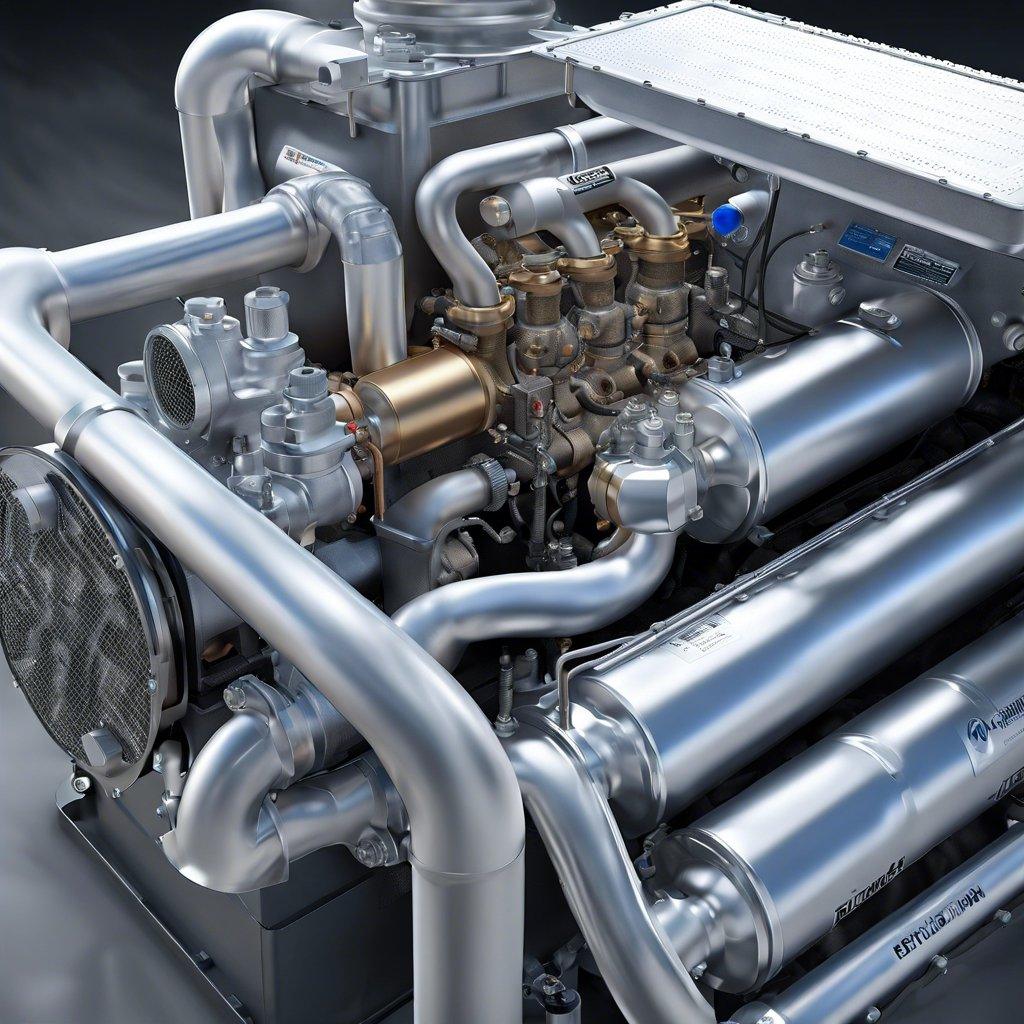Understanding Your Vehicle: Where is the Fuel Filter?
Deciphering the Fuel Filtration System: Locating the Hidden Guardian

As engineering and technology professionals, understanding the intricacies of your vehicle’s fuel system is paramount. Buried beneath the surface, the fuel filter stands as a silent guardian, ensuring the purity of the lifeblood that powers your ride. In this comprehensive guide, we’ll delve into the fuel filtration system, uncovering the critical role of the fuel filter and its strategic placement within your vehicle.
The Fuel Filtration System: A Vital Line of Defense
The fuel filtration system is designed to safeguard your engine from contaminants that can wreak havoc on its delicate components. Fuel, drawn from the tank, passes through a series of filters before reaching the engine. At the heart of this system lies the fuel filter, a small but mighty component responsible for trapping and removing impurities such as dirt, rust, and other particulates.
Locating the Fuel Filter: A Hidden Treasure
The fuel filter’s strategic placement within your vehicle can vary depending on the make, model, and year. Typically, it is located in one of the following areas:
- Under the vehicle, near the fuel tank
- In the engine compartment, often mounted on the firewall or a nearby bracket
- Inline with the fuel line, accessible from the top or side of the engine
Accessing the fuel filter may require some investigation, as it is often hidden from plain sight to protect it from the elements and potential damage. Consult your vehicle’s service manual or contact a qualified technician for specific guidance on locating the fuel filter in your particular model.
Maintaining the Fuel Filter: A Proactive Approach
Regular maintenance of the fuel filter is crucial to ensuring the longevity and optimal performance of your vehicle. Manufacturers typically recommend replacing the fuel filter at intervals specified in the owner’s manual, often ranging from 30,000 to 60,000 miles. Neglecting this essential component can lead to a host of issues, including reduced fuel efficiency, decreased engine power, and, in severe cases, complete engine failure.
Empowering Your Vehicle: Understanding the Fuel Filtration System
As an engineering or technology professional, your understanding of your vehicle’s fuel filtration system is paramount. By locating the fuel filter and recognizing its importance, you can take a proactive approach to maintaining your vehicle’s performance and longevity. Remember, the fuel filter may be hidden, but its role in safeguarding your engine is anything but.
Unraveling the Fuel Filtration Mystery: A Quest for Optimal Performance
As engineering and technology employees, understanding the intricate workings of your vehicle’s fuel system is essential for ensuring optimal performance and longevity. At the heart of this system lies a crucial component: the fuel filter. This unassuming device plays a vital role in maintaining the purity of the fuel that flows through your engine, and its location is key to unlocking the mysteries of your vehicle’s fuel filtration system.
Locating the Fuel Filter: A Treasure Hunt
The fuel filter is typically positioned in one of three primary locations within your vehicle:
- In the fuel tank
- Inline between the fuel tank and the fuel pump
- Directly before the fuel injectors
Identifying the precise location of your vehicle’s fuel filter can be a treasure hunt, as it may be hidden behind panels, beneath the vehicle, or even integrated within other components. Consulting your owner’s manual or seeking the expertise of a qualified technician can be invaluable in pinpointing the filter’s location and ensuring proper maintenance.
The Importance of Fuel Filtration
The fuel filter serves a critical purpose in your vehicle’s fuel system. It acts as a barrier, trapping contaminants such as dirt, rust, and other particulates that can accumulate in the fuel over time. By filtering out these impurities, the fuel filter helps to protect your engine’s sensitive components, including the fuel pump and injectors, from premature wear and potential damage.
| Fuel Filter Location | Advantages | Disadvantages |
|---|---|---|
| In the fuel tank | Captures contaminants early in the fuel system | Difficult to access and replace |
| Inline between the tank and pump | Easily accessible for maintenance | May not capture all contaminants before the fuel pump |
| Before the fuel injectors | Provides the most comprehensive filtration | Requires disassembly for replacement |
Maintaining Optimal Fuel Filtration
Regularly replacing your vehicle’s fuel filter is essential for maintaining optimal engine performance and fuel efficiency. Neglecting this maintenance task can lead to a build-up of contaminants, resulting in decreased fuel flow, reduced power, and even costly repairs. By staying vigilant and adhering to your manufacturer’s recommended replacement intervals, you can ensure that your vehicle’s fuel system operates at its best, delivering the power and reliability you expect.
Unraveling the mysteries of fuel filtration is a crucial step in understanding the inner workings of your vehicle. By locating the fuel filter and recognizing its importance, you can take proactive steps to maintain your engine’s health and optimize its performance, ultimately enhancing your overall driving experience.
Mastering the Fuel Filtration Labyrinth: Key to Prolonged Engine Life
As an engineering or technology professional, understanding the intricacies of your vehicle’s fuel system is paramount. At the heart of this intricate network lies the fuel filter, a crucial component that ensures the longevity and efficient performance of your engine. In this comprehensive guide, we will delve into the importance of the fuel filter, its location, and how to maintain it for optimal engine health.
The Fuel Filter: Unsung Hero of Engine Performance
The fuel filter is responsible for removing impurities, contaminants, and particulate matter from the fuel before it reaches the engine. Over time, these foreign elements can accumulate and cause significant damage to sensitive fuel system components, such as the fuel injectors, fuel pump, and the engine itself. By effectively filtering the fuel, the fuel filter plays a pivotal role in preserving the integrity of your engine’s internal components and ensuring its prolonged lifespan.
Locating the Fuel Filter: A Guided Tour
The location of the fuel filter can vary depending on the make, model, and year of your vehicle. In most cases, the fuel filter is situated along the fuel line, often near the fuel tank or the engine compartment. It is typically encased in a protective housing and can be easily accessible for inspection and replacement. Consult your vehicle’s owner’s manual or a trusted mechanic to determine the exact location of the fuel filter in your specific model.
Maintaining the Fuel Filter: A Preventive Measure
Regular maintenance of the fuel filter is crucial for the longevity of your engine. The recommended replacement interval for the fuel filter can vary, but it is generally advisable to replace it every 30,000 to 50,000 miles or as specified by the manufacturer. Neglecting to replace the fuel filter can lead to a buildup of contaminants, resulting in decreased fuel efficiency, reduced engine power, and potentially costly engine repairs.
The Fuel Filtration Labyrinth: A Comprehensive Approach
Mastering the fuel filtration system is a key component of comprehensive vehicle maintenance. By understanding the vital role of the fuel filter, its location, and the importance of regular replacement, you can take proactive steps to safeguard the health and longevity of your engine. Embrace the fuel filtration labyrinth and unlock the secret to prolonged engine life.
As an engineering or technology professional, understanding the critical role of the fuel filter in your vehicle’s performance and longevity is paramount. This unsung hero, often tucked away and out of sight, is the gatekeeper that protects your engine from the impurities that can wreak havoc on its delicate components.
The fuel filter is strategically placed between the fuel tank and the engine, serving as a barrier that traps contaminants such as dirt, rust, and other debris before they can reach the sensitive fuel injection system. By keeping these impurities at bay, the fuel filter ensures that your engine receives a clean and consistent supply of fuel, optimizing its efficiency and extending its lifespan.
Navigating the fuel filtration landscape can be a daunting task, as the location and accessibility of the fuel filter can vary widely across different vehicle models and makes. In some cases, the filter may be easily accessible, while in others, it may be hidden behind layers of components, requiring a more intricate approach to access and maintain.
Uncovering the Unseen Safeguard
To uncover the unseen safeguard of the fuel filter, it is essential to familiarize yourself with the specific design and layout of your vehicle’s fuel system. Consulting your owner’s manual or seeking guidance from a trusted automotive professional can provide invaluable insights into the location and accessibility of the fuel filter.
Once you have identified the fuel filter’s location, regular inspection and replacement become crucial. Over time, the filter can become clogged with accumulated contaminants, reducing fuel flow and potentially leading to engine performance issues or even complete failure. By proactively replacing the fuel filter according to the manufacturer’s recommended schedule, you can ensure that your vehicle’s fuel system continues to operate at peak efficiency, safeguarding the long-term health of your engine.
Embracing the importance of the fuel filter and understanding its role in your vehicle’s well-being is a testament to your commitment as an engineering or technology professional. By mastering the intricacies of fuel filtration, you can unlock a deeper understanding of your vehicle’s inner workings, empowering you to make informed decisions and maintain your vehicle with confidence.




Post Comment